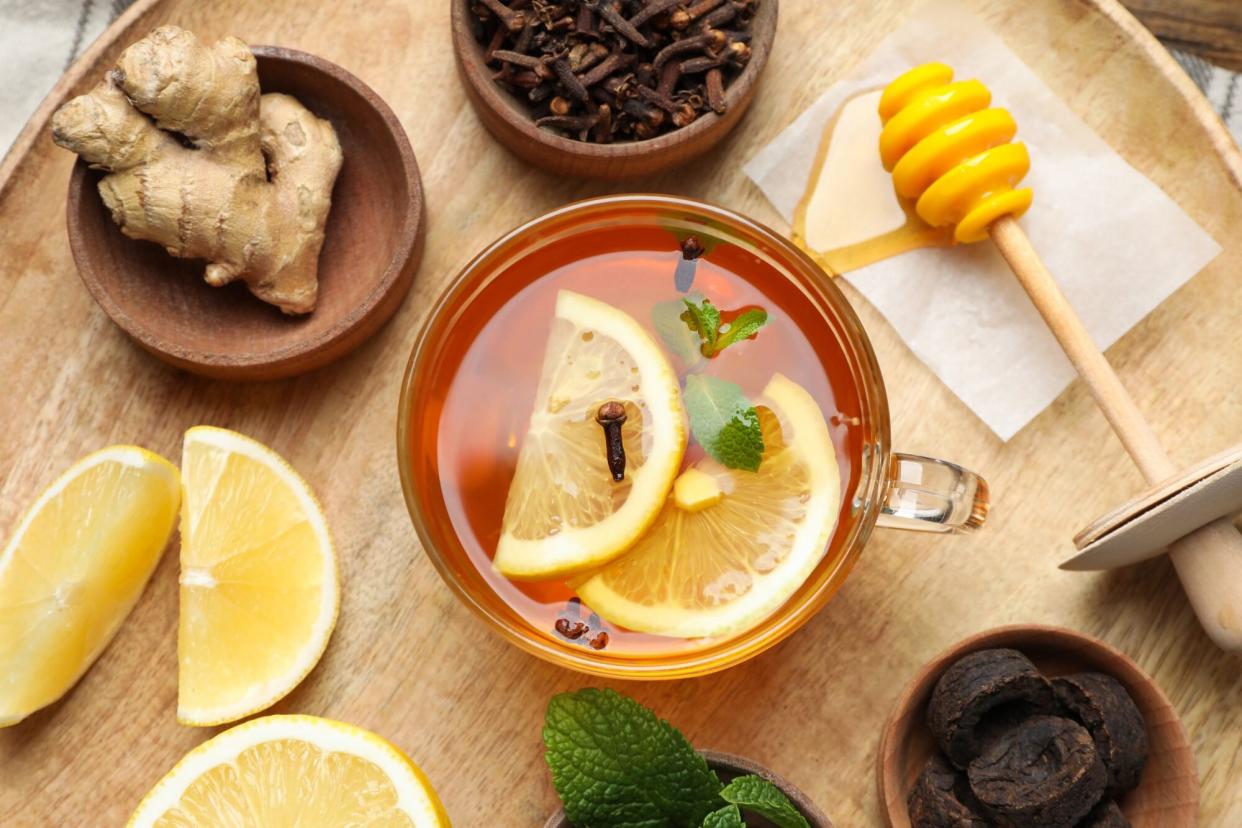Natural Cold and Flu Remedies That Actually Work, According to Doctors

GETTY IMAGES
You do your best to avoid falling sick when cold and flu season hits by getting your annual flu shots and COVID-19 booster, but despite your best efforts, the sniffles oftentimes strike. And while most of us turn to fever and cough suppressants to feel better, it might be habit to reach for a few natural remedies, too—especially if brewing a cup of honey-ginger tea is something your mom used to do.
But do these solutions go beyond ritual? Are natural remedies really effective? We reached out to few doctors to discover just how helpful ingredients like honey, ginger, zinc, and garlic actually are when it comes to battling common seasonal illnesses.
Related: How to Distinguish Symptoms of the Common Cold, Flu, and COVID-19 This Winter
Natural Remedies That Will Help You Feel Better
Honey
Certain natural ingredients may help the body fight certain germs, while also helping to relieve symptoms, says Laura Purdy, MD, MBA. Honey is one of them, so go ahead and add an extra dollop to that hot tea: The sticky sweetener boasts minor antibacterial properties, which may help to kill off nasty germs. "Honey can also help to coat and soothe the throat after coughing—but it is not recommended for kids younger than one year," says Dr. Purdy.
Ginger
Colds and flus often come with upset stomachs—to settle yours, pick up some ginger. "Ginger is an anti-emetic, which means it prevents nausea and stomach pain," says Jill Carnahan, MD, a nutrition and functional medicine specialist and author of Unexpected, who suggests sipping on ginger tea sweetened with honey when you're under the weather. "It also aids with motility, so if someone has a lack of appetite, ginger can be helpful."
According to Dr. Purdy, ginger also promotes sweating (which helps eliminate toxins or break fevers) and reduces inflammation (which contributes to pain and illness).
Garlic
This tasty allium might help you feel better faster, says Dr. Purdy. "Garlic contains potentially anti-microbial allicin to help fight off harmful microbes," she says. "Many people swear by it to help stay healthy or get well."
Foods High in Zinc
According to Dr. Purdy, many scientists believe that zinc may prevent cold germs from multiplying, reducing illness by up to one full day—especially if it is taken as soon as symptoms appear. Most opt to take zinc in pill form when they're ill, but there are plenty of ways to work it into your diet before you get sick; beans, nuts, beef, and seafood all have a high zinc content.
And while taking zinc—or following any of the above natural remedies, for that matter—to feel better isn't 100% scientifically proven, some people will see results, notes Dr. Purdy. At the very least, sipping on hot tea and eating as well as you can while you're sick will make you feel better in the moment.
Other Easy Ways to Stay Healthy This Winter
There are a few "natural" ways you can prime your body to stay healthy before the cold or flu strikes, say our experts.
Fill Up on Probiotics
Look into your fridge for foods that keep your body strong, like enriched yogurts that contain probiotics. According to Dr. Purdy, this is a new-age natural remedy that is thought to be beneficial because a happy gut contributes to overall good health.
Add Vitamins to Your Daily Routine
Dr. Carnahan advises taking preventative measures going into the cold-weather season, and suggests adding zinc, vitamin C, and vitamin D to your morning vitamin regime. A 15 to 30 mg dose of zinc and a 2000 to 5000 IUs dose of vitamin D can be particularly helpful, she says. "Vitamin C can be taken at extremely high doses, but if too high, can cause diarrhea," she says. "Take 2000 to 3000 mg of vitamin C per day when you're sick—that's ideal." You can also find this "old, faithful immune-boosting ingredient" in everything from OJ to bananas, adds Dr. Purdy.
As with every vitamin or supplement, consult your doctor before adding any of the above into your routine.
Up Your Fluid Intake
Though stocking up on the above ingredients—or pulling them out in a pinch when you're ill—can be helpful, it's more important to remain mindful about your overall health, which includes staying hydrated, says Dr. Purdy. "One thing I always stress: Drink plenty of water," she says. "Natural remedies aren't meant to be magic cure-alls, but they can help certain patients when part of a healthy lifestyle."

